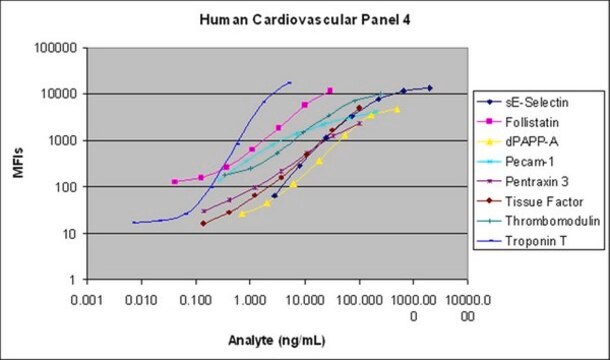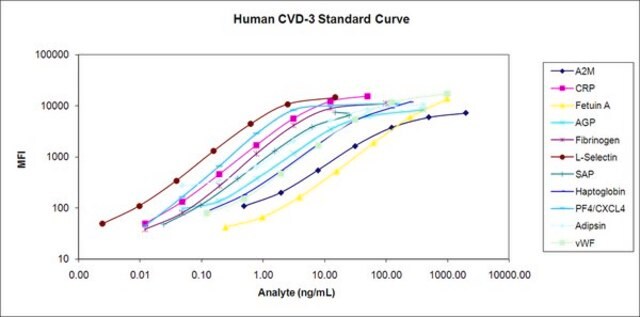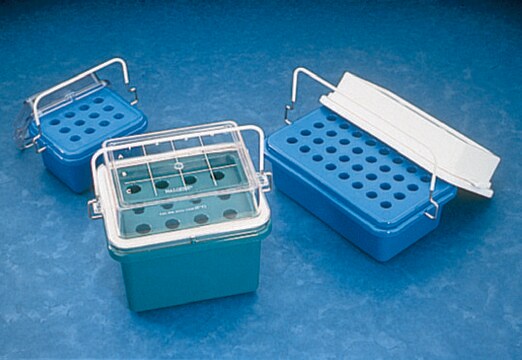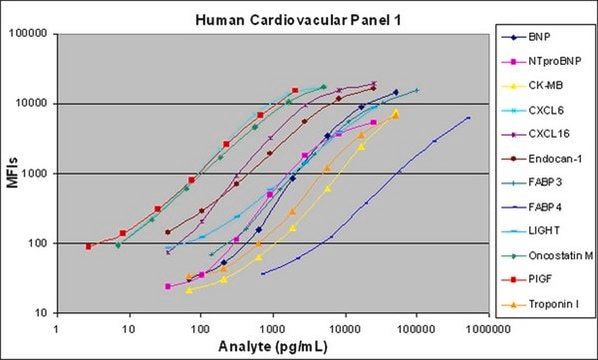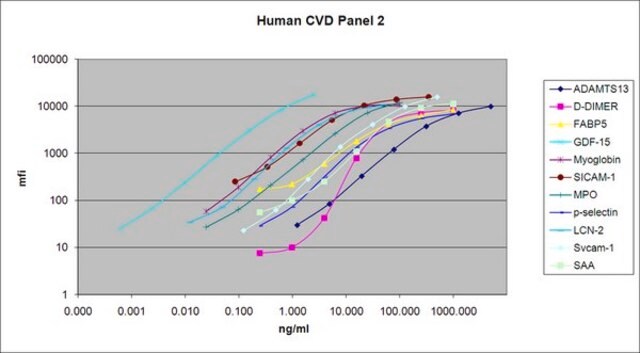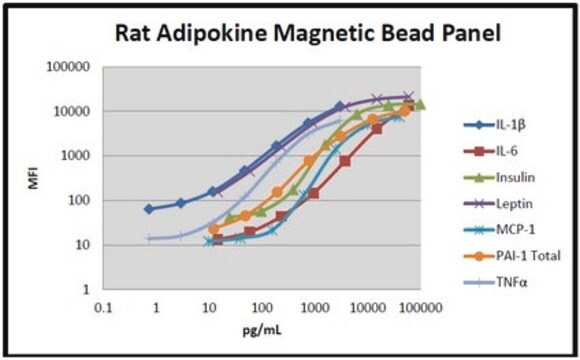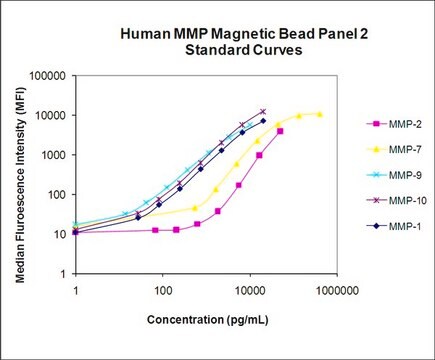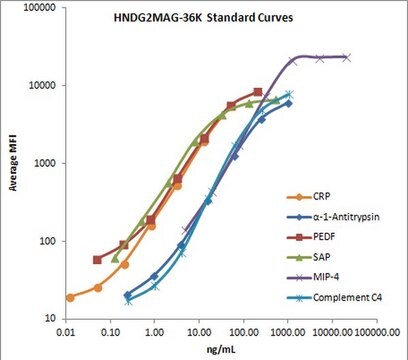HCVD6MAG-67K
MILLIPLEX® Human Cardiovascular Disease Magnetic Bead Panel 6 - Cardiovascular Disease (CVD) Multiplex Assay
The analytes available for this multiplex kit are: sCD14, DPP4/sCD26, Endostatin, pGRN, LRG1, MCAM, ucMGP
About This Item
Recommended Products
Quality Level
species reactivity
human
manufacturer/tradename
Milliplex®
assay range
accuracy: 92%
(Endostatin)
accuracy: 95%
(ucMGP)
accuracy: 97%
(DPP4/sCD26)
sensitivity: 0.007 ng/mL
(MinDC+2SD; Endostatin)
sensitivity: 0.014 ng/mL
(MinDC+2SD; pGRN)
sensitivity: 0.015 ng/mL
(MinDC+2SD; LRG1)
sensitivity: 0.016 ng/mL
(MinDC+2SD; MCAM)
sensitivity: 0.016 ng/mL
(MinDC+2SD; sCD14)
sensitivity: 0.041 ng/mL
(MinDC+2SD; DPP4)
sensitivity: 0.052 ng/mL
(MinDC+2SD; ucMGP)
standard curve range: 0.002-10 ng/mL
(Endostatin)
standard curve range: 0.01-40 ng/mL
(sCD14)
standard curve range: 0.024-100 ng/mL
(LRG1)
standard curve range: 0.024-100 ng/mL
(MCAM)
standard curve range: 0.024-100 ng/mL
(pGRN)
standard curve range: 0.049-200 ng/mL
(DPP4/sCD26)
standard curve range: 0.049-200 ng/mL
(ucMGP)
inter-assay cv: <10%
intra-assay cv: <5%
(DPP4/sCD26)
inter-assay cv: <10%
intra-assay cv: <5%
(Endostatin)
inter-assay cv: <10%
intra-assay cv: <5%
(LRG1)
inter-assay cv: <10%
intra-assay cv: <5%
(MCAM)
inter-assay cv: <10%
intra-assay cv: <5%
(pGRN)
inter-assay cv: <20%
intra-assay cv: <10%
(ucMGP)
inter-assay cv: <20%
intra-assay cv: <5%
(sCD14)
technique(s)
multiplexing: suitable
detection method
fluorometric (Luminex xMAP)
shipped in
ambient
General description
The MILLIPLEX® Human Cardiovascular Disease (CVD) Panel 6 is a 7-plex kit may be used to simultaneously quantify any or all the following analytes in human serum, plasma, and tissue culture samples: Soluble Cluster of Differentiation 14 (sCD14), Dipeptidyl Peptidase-4 (DPP4/DPPIV) / Soluble Cluster of Differentiation 26 (sCD26), Endostatin / Collagen Alpha-1 (XVIII) (COL181A), Progranulin (pGRN) / Proepithelin (PEPI) / PC Cell-derived Growth Factor (PCDGF) / Acrogranin / Paragranulin, Leucine-rich Alpha-2-Glycoprotein 1 (LRG1), Melanoma Cell Adhesion Molecule (MCAM) / Soluble Cluster of Differentiation 146 (sCD146) / Cell Surface Glycoprotein MUC18, Uncarboxylated Matrix Gamma-Carboxyglutamate (Gla) Protein (ucMGP). This kit uses a 96-well format, contains a lyophilized standard cocktail, two internal assay quality controls and can measure up to 38 samples in duplicate.
The Luminex® xMAP® platform uses a magnetic bead immunoassay format for ideal speed and sensitivity to quantitate multiple analytes simultaneously, dramatically improving productivity while conserving valuable sample volume.
Panel Type: Cardiovascular
Specificity
There was no or negligible cross-reactivity between the antibodies for an analyte and any of the other analytes in this panel.
Application
- Analytes: Monocyte Differentiation Antigen (CD14/sCD14), Dipeptidyl Peptidase-4 (DPP4/sCD26), Endostatin, Leucine-rich α-2-glycoprotein 1 (LRG1), Cell Surface Glycoprotein (MCAM/ MUC18/sCD146), Progranulin (pGRN), Uncarboxylated Matrix Gla Protein (ucMGP)
- Recommended Sample Type:
- Human serum, plasma, cell/tissue culture supernatants and lysates
- Recommended Sample Dilution: 25 μL per well of 1:500 diluted serum or plasma; cell/tissue culture supernatants or lysates may be used undiluted ore or diluted in appropriate control medium
- Assay Run Time: Overnight (16-18 hours)at 2-8°C will yield optimal sensitivity.2- A 2 hour incubation at room temperature (20-25°C) may also be used.
- Research Category: Cardiovascular Disease
- Research Subcategory: Metabolic Disorders
Features and Benefits
Packaging
Storage and Stability
Other Notes
Legal Information
Disclaimer
Signal Word
Danger
Hazard Statements
Precautionary Statements
Hazard Classifications
Acute Tox. 4 Dermal - Acute Tox. 4 Inhalation - Acute Tox. 4 Oral - Aquatic Chronic 2 - Eye Dam. 1 - Skin Sens. 1 - STOT RE 2
Target Organs
Respiratory Tract
Storage Class Code
10 - Combustible liquids
Certificates of Analysis (COA)
Search for Certificates of Analysis (COA) by entering the products Lot/Batch Number. Lot and Batch Numbers can be found on a product’s label following the words ‘Lot’ or ‘Batch’.
Already Own This Product?
Find documentation for the products that you have recently purchased in the Document Library.
Our team of scientists has experience in all areas of research including Life Science, Material Science, Chemical Synthesis, Chromatography, Analytical and many others.
Contact Technical Service